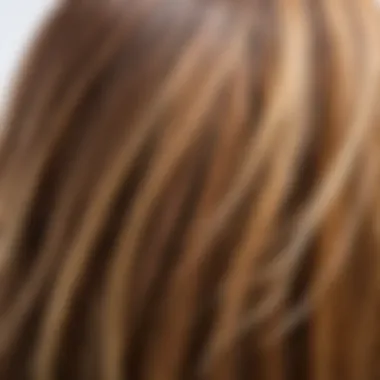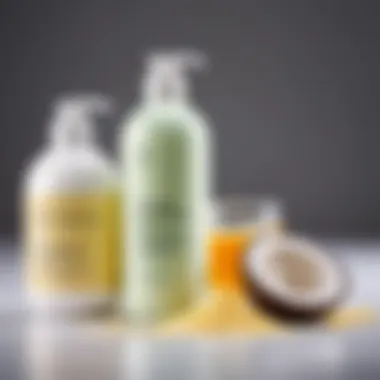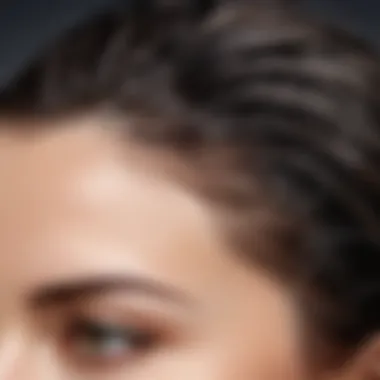Do Hair Conditioners Cause Hair Loss? An In-Depth Examination


Intro
The connection between hair care products and hair loss has long been a topic of debate. Many individuals wonder whether the use of hair conditioners may contribute to thinning or shedding hair. This question is not merely rooted in popular opinion; it raises concerns about the safety and efficacy of hair conditioners in general.
Hair conditioners are designed to improve the texture and manageability of hair. They work by coating the hair strands, providing hydration, and reducing frizz. However, with the increasing awareness of ingredients used in hair care products, people are questioning their long-term effects on hair health. As consumers become more informed about beauty products, they seek to understand the implications of their daily routines.
To gain a clearer understanding, we will explore the composition of hair conditioners, their intended benefits, and the scientific research regarding hair loss. We aim to address common apprehensions surrounding these products to equip readers with practical knowledge.
By dissecting this important aspect of personal care, we will help determine if hair conditioners indeed cause hair loss or if other factors should be considered.
Through this investigation, we strive for clarity on a subject that affects not just individual confidence but also general well-being.
Understanding Hair Conditioners
Understanding the role of hair conditioners is crucial in addressing the question of whether they contribute to hair loss. Hair conditioners serve varied purposes in hair care routines, aiming to improve the look and feel of hair. They work by replenishing moisture, reducing tangles, and making hair more manageable. As people become more conscious of their choices, knowing about conditioners' functions and types can help in making informed decisions regarding their hair products.
What is Hair Conditioner?
Hair conditioner is a product designed to enhance the texture and appearance of hair after washing. It typically contains ingredients that provide hydration, reduce static, and help with styling. Conditioners coat the hair shaft, creating a barrier that locks in moisture and protects hair from damage during styling or exposure to environmental stressors.
Types of Hair Conditioners
Several types of hair conditioners exist, each designed for specific hair needs and preferences. Understanding these types can guide consumers in choosing the right product for their hair type and condition.
Leave-in Conditioners
Leave-in conditioners are lightweight formulations meant to be left in the hair after washing. They are designed to provide additional moisture and protection throughout the day. One key characteristic is their ability to detangle hair without weighing it down. This makes leave-in conditioners a popular choice for those with fine or easily tangled hair. Their unique feature is that they can also offer some heat protection when styling, though they might not provide as deep a moisture boost as other types.
Rinse-out Conditioners
Rinse-out conditioners are perhaps the most common. These products are applied after shampooing and are meant to be washed out after a few minutes. The primary purpose is to provide immediate hydration and smoothness. Rinse-out conditioners often contain silicones, which can impart shine and reduce frizz. While effective for many, they can sometimes leave a residue that may lead to buildup over time, especially for those with oily or fine hair.
Deep Conditioners
Deep conditioners are richer formulations that penetrate the hair more deeply compared to regular conditioners. They are used less frequently, typically once a week or as needed. The key characteristic is their ability to repair damage and restore moisture to dry or damaged hair, making them beneficial for individuals who frequently color or heat-style their hair. Their unique feature is the longer application time, which allows the ingredients to work effectively. However, using deep conditioners too often can lead to overly soft hair that lacks the necessary structure.
Hair Masks
Hair masks are intensive treatments that provide deep nutrition and hydration. They are similar to deep conditioners but are often thicker and richer, designed for more serious repair. Hair masks can be particularly beneficial for very dry, curly, or color-treated hair. The key advantage is that they deliver a higher concentration of conditioning agents, which can result in noticeably healthier hair after use. However, the downside is that they may require a longer time to apply and wash out, which not everyone finds convenient.
In summary, understanding different types of hair conditioners is essential. This knowledge empowers users to select products that best meet their hair care needs, which is particularly relevant when discussing the impact of these products on hair loss.
The Composition of Hair Conditioners
Understanding the composition of hair conditioners is essential when discussing their impact on hair health. Conditioners are formulated to provide various benefits, such as moisture retention, shine, and manageability. However, the ingredients used in these products can also raise concerns about their safety, effectiveness, and any potential contribution to hair loss. An in-depth examination of these components will reveal both their benefits and drawbacks, thereby aiding consumers in making discerning choices for their hair care routines.
Key Ingredients in Hair Conditioners
Hair conditioners are designed with a range of key ingredients that serve specific purposes in improving hair health. Some of the most common ingredients include:
- Emollients: These are oils or silicones that provide lubrication and reduce frizz.
- Humectants: These compounds attract moisture from the air and help in hydration, keeping hair soft.
- Proteins: Ingredients like keratin and silk proteins can strengthen the hair shaft and improve structure.


These key ingredients work together to restore moisture, fortify hair, and enhance its overall appearance. However, understanding individual components can aid in choosing the right product for specific hair types or conditions.
Chemicals of Concern
While many ingredients in hair conditioners are beneficial, certain chemicals have attracted scrutiny due to their potential adverse effects. A few of these components are often noted:
Silicones
Silicones are frequently used in hair conditioners for their ability to create a protective layer around hair strands, leading to a smooth and shiny appearance. The key characteristic of silicones is their occlusive nature, which traps moisture. This makes them a popular choice to enhance shine and reduce frizz. However, over time, they can build up on the hair, possibly leading to dullness and requiring stronger cleaning agents to remove. This buildup can stress hair and could contribute to breakage in certain individuals.
Sulfates
Sulfates are commonly found in shampoos and sometimes in conditioners due to their effective cleansing properties. They create lather and help remove dirt and excess oils from hair. However, sulfates can strip the hair of its natural oils, leading to dryness and irritation for those with sensitive scalps. Their presence in conditioners can aggravate dry or color-treated hair, potentially making it more prone to breakage, which could be misconstrued as hair loss.
Parabens
Parabens are preservatives added to extend shelf life and prevent microbial growth in hair products. The key characteristic of parabens is their effectiveness in maintaining product stability. While they have been widely used for years, some studies have raised concerns about their possible link to hormone disruption. Although the scientific evidence is still debated, consumers increasingly seek paraben-free products as a precaution.
Fragrances
Fragrances are often included in hair conditioners to provide a pleasant scent. They can enhance the user experience but may also be problematic. The unique feature of fragrances is their ability to mask other odors, making hair care products more appealing. Nevertheless, some individuals may develop allergies or sensitivities to specific fragrance components, leading to scalp irritation or allergic reactions.
It is vital for consumers to research individual components in hair products to make informed choices that suit their hair type and health needs.
In summary, the composition of hair conditioners plays a crucial role in their efficacy and safety. While many key ingredients are designed to improve hair health, others raise concerns that warrant careful consideration. Being educated about these components allows consumers to choose hair care products that align with their values and hair goals.
The Science of Hair Loss
Understanding the science behind hair loss is essential when discussing any potential links to hair conditioners. It provides a framework for assessing how various factors, including products applied to the hair, can affect hair health. By exploring the primary causes of hair loss and specific conditions such as telogen effluvium, one can gain insight into whether hair conditioners are a factor in this complex issue. This background knowledge will help readers make informed decisions on their hair care products.
What Causes Hair Loss?
Hair loss can occur due to a multitude of reasons. Here are some primary causative factors:
- Genetics: Hereditary conditions like male-pattern baldness affect many individuals, influencing the risk of hair loss.
- Hormonal Changes: Conditions such as pregnancy, menopause, or disorders like polycystic ovary syndrome can alter hormone levels, leading to shedding.
- Nutritional Deficiencies: Lack of essential nutrients, including vitamins and minerals, can weaken hair and promote loss.
- Medical Conditions: Thyroid disorders, autoimmune diseases, and skin conditions can contribute significantly to hair fallout.
- Stress: Emotional or physical stressors can trigger temporary hair loss, known as telogen effluvium.
In this multifaceted landscape, understanding individual hair loss causes will guide discussions on specific hair products, including conditioners.
Understanding Telogen Effluvium
Telogen effluvium is a temporary form of hair loss that occurs when a significant number of hair follicles enter the resting phase of the hair growth cycle prematurely. The following points highlight its critical aspects:
- Cause: This condition is often triggered by stress, illness, or drastic changes such as surgery or extreme weight loss.
- Symptoms: Individuals may notice increased hair shedding, particularly in areas that are most affected during brushing or washing.
- Duration: Typically, telogen effluvium resolves within six to nine months, with hair regrowth following the illness or disturbance.
- Impact of Products: While hair conditioners by themselves usually do not cause telogen effluvium, poor product choices may exacerbate underlying damage if they contain harsh chemicals.
Understanding telogen effluvium can serve as a diagnostic tool. It effects of stress and other factors are isolated from the effects of hair products, such as conditioners. In the context of this article, it will help discern if hair products indeed hold any responsibility for hair loss.
Can Hair Conditioners Cause Hair Loss?
The discussion about hair conditioners and their potential role in hair loss is an important topic in the realm of hair care. Many consumers are becoming increasingly aware of the products they use, asking whether the conditioners they apply daily may contribute to hair thinning or loss. Understanding this relationship is essential for making informed decisions regarding personal hair care routines.
The significance of this section lies in addressing the common concerns over hair conditioners. Some individuals report changes in their hair after starting new conditioning products, leading to speculation about the ingredients and their effects. It is also crucial to consider that reactions to hair products can vary widely among individuals due to factors like hair type, skin sensitivity, and personal health conditions.
This topic carries the weight of both anecdotal accounts and scientific inquiry. By exploring the evidence, professional viewpoints, and popular myths surrounding hair conditioners, we aim to dissect the layers of this complex issue. The goal is to separate fact from fiction, providing clarity on whether hair conditioners truly impact hair health negatively.


Examining the Evidence
When evaluating the potential relationship between hair conditioners and hair loss, one must look at scientific studies and anecdotal reports. Studies have shown that certain chemicals in hair care products can cause adverse reactions in some individuals, possibly leading to temporary hair shedding. However, it is vital to distinguish reactions from the product itself versus underlying health conditions that may predispose individuals to hair loss.
Research does suggest that ingredients like sulfates and parabens, commonly found in hair conditioners, may irritate the scalp and cause dryness. This dryness can lead to brittle hair, making it more prone to breakage. While this does not equate to hair loss in the clinical sense, it can contribute to the perception of thinning hair. Moreover, hypersensitivity to certain fragrance compounds or preservatives can cause allergic reactions that might manifest as inflammation or hair loss.
Expert Opinions
Dermatologists' Insights
Dermatologists often emphasize the importance of individual skin and hair health. They typically advocate for gentle, hypoallergenic formulas. One of the key characteristics of such products is their lack of known irritants. They can provide moisture without compromising scalp health, preserving hair integrity. This view is beneficial, as dermatologists guide patients to opt for products specifically catered to their unique needs.
Dermatologists encourage patients to consider both the function of the conditioner and the health of the scalp. The unique feature of their recommendations focuses on balancing the needs of conditioning with avoiding irritation. It helps minimize risks associated with product misuse or allergic reactions, promoting overall scalp health which is crucial for hair growth.
Trichologists' Perspectives
Trichologists, on the other hand, take a specialized view of hair and scalp issues. They aim to understand hair loss from both cosmetic and clinical perspectives. The defining aspect of their insights involves analyzing hair structure and growth cycles. They often highlight the importance of nutrients and overall health rather than just product application. This approach adds depth to understanding beneath product-related concerns.
Trichologists often recommend using products that can fortify hair from within rather than relying solely on external treatments. They examine how conditioners may provide temporary relief or benefits but suggest that resolving underlying health issues is more effective long-term. Thus, they promote a holistic view of hair care, ensuring healthier outcomes for consumers.
Common Concerns Surrounding Hair Care Products
In discussions about hair care, various concerns arise concerning the products used daily. Understanding these common concerns is vital to address fear and misinformation that might exist among consumers. By clarifying these issues, this article aims to demystify the narrative surrounding hair conditioners and their effects on hair health. A thoughtful exploration into myths and allergic reactions will inform decisions and enhance hair care routines.
Myths vs. Facts
A number of myths circulate in the realm of hair care, especially regarding hair conditioners. One common myth is that using conditioner leads to faster hair loss. However, scientific evidence largely disputes this claim. Conditioners are designed to enhance the appearance and texture of hair, not to inhibit growth or strength.
Here are some prevailing myths alongside factual clarifications:
- Myth: Conditioners cause hair to fall out.
Fact: Many factors contribute to hair loss, including genetics, stress, and health conditions. Conditioners alone are not a primary cause. - Myth: Natural ingredients are always better.
Fact: Not all natural ingredients are suitable for every hair type. Some individuals may have reactions even to natural extracts. - Myth: You should use a lot of conditioner for better results.
Fact: Using excessive amounts can lead to buildup, making hair heavy and greasy. A moderate amount tailored to your hair type is more effective.
This segment is essential in breaking down misconceptions and promoting informed choices. Discarding these myths not only supports healthy hair practices but also helps consumers select their products with confidence.
Allergic Reactions and Sensitivities
Allergic reactions to hair care products, including conditioners, are a reality for some individuals. Ingredients in these products can trigger sensitivities, often leading to scalp irritation or discomfort. The knowledge of potential allergens is necessary for anyone who uses hair products, and being vigilant is key to maintaining healthy hair.
The following points summarize common allergens found in conditioners:
- Fragrances: Certain fragrances can lead to contact dermatitis. It's wise to choose fragrance-free options if there’s a history of sensitive skin.
- Preservatives: Chemicals such as parabens are engineered to extend product shelf life but can cause reactions in some. Consider options labeled as paraben-free.
- Sulfates: These common cleansing agents may irritate primarily sensitive scalps. Sulfate-free conditioners can be beneficial alternatives.
Being aware of one's own reactions and understanding ingredient labels is crucial. Consulting a dermatologist or a trichologist for personalized recommendations can also mitigate risks while ensuring a healthy approach to hair care.
"Understanding your body’s reactions to hair products can lead to significant improvements in overall hair health."
Improving Hair Health
The journey to healthier hair is a fundamental aspect of maintaining one's overall appearance. Understanding how to improve hair health can lead to not only better aesthetics but also enhanced self-esteem. Hair conditioners, when chosen wisely, play a critical role in this process. They are designed to nourish and hydrate hair, combatting dryness and damage. However, the choice of conditioner matters significantly. Choosing the right product tailored to one’s hair type and specific needs is essential for achieving optimal results.
Choosing the Right Conditioner
Selecting the appropriate hair conditioner is vital for enhancing hair health. Here are some considerations:


- Hair Type: Different hair types have varying needs. For instance, fine hair may benefit from lightweight formulas, while curly hair often requires heavier moisturizers. Knowing your hair type can guide you in your selection.
- Ingredients: Look for beneficial ingredients like natural oils, proteins, and vitamins. Ingredients like jojoba oil, argan oil, and keratin can help strengthen and smooth hair.
- Avoiding Harmful Chemicals: Be cautious of conditioners containing sulfates and parabens. These additives can strip the hair of its natural oils and may cause irritation, potentially leading to hair loss.
A thorough review of products is advisable. Look for conditioners with favorable reviews regarding their impact on hair health.
Tips for Hair Care Routines
Implementing an effective hair care routine can enhance the benefits of any conditioner you choose. Consider the following tips:
- Consistency is Key: Regular use of conditioner tailored to your hair type can promote hydration and manageability.
- Don't Overdo It: While conditioners are beneficial, using them excessively can result in buildup, which weighs hair down. Following the manufacturers' usage recommendations is wise.
- Incorporate Deep Conditioning: Periodically using deep conditioners or hair masks can provide intense hydration and repair to hair, especially for those who frequently style or color their hair.
"Healthy hair starts with understanding how to care for it. Tailoring your routine can yield significant improvements."
- Be Gentle: When washing and conditioning, avoid aggressive scrubbing. Instead, use a gentle touch to prevent unnecessary breakage.
- Protect Your Hair: During styling, use heat protectants to minimize damage from tools such as blow dryers and curling irons.
By focusing on selecting the right conditioner and implementing a thoughtful hair care routine, individuals can significantly improve the health and appearance of their hair. Such proactive steps not only enhance aesthetics but can also increase confidence, impacting social and professional interactions.
Consumer Awareness and Responsible Choices
Understanding the interplay between hair conditioners and hair health is crucial for informed consumer decisions. The increasing availability of hair care products makes it essential for individuals to know what they apply to their hair. Many people rely heavily on conditioners for moisture and manageability. However, awareness about the potential effects these products can have on hair health is often lacking.
One significant aspect of consumer awareness is recognizing that not all products are created equal. Many conditioners contain various chemicals and additives that may not suit every individual's scalp or hair type. By being knowledgeable about the ingredients used, users can choose products that align with their hair's specific needs while minimizing the risk of adverse effects.
Informed decisions benefit consumers not only in terms of hair health but also economic choices. Spending on conditioners that contribute to unwanted hair loss can lead to further financial outlay on treatments or replacements. Additionally, understanding eco-conscious and cruelty-free products can resonate with consumers who value sustainability. Being informed, thus, fosters not just personal well-being but also a wider ethical consideration in consumer choices.
Reading Labels Effectively
Reading product labels carefully can reveal much about a hair conditioner’s formulation. Ingredients are often listed in descending order by quantity, allowing consumers to identify the primary components. One should pay special attention to the first five ingredients, as they constitute the majority of the product.
For example, it is advisable to look for natural oils, proteins, and botanicals that promote hair health. Ingredients such as argan oil, coconut oil, and aloe vera are known for their conditioning properties.
On the other hand, consumers should be wary of certain harmful additives.
- Silicones can build up on the hair, leading to dryness over time.
- Sulfates may strip natural oils and cause scalp irritation.
- Parabens are often avoided due to potential hormonal impacts.
- Fragrances can sometimes lead to allergic reactions.
By decoding labels, one can avoid products that may contribute to hair loss, therefore ensuring healthier hair choices.
Seeking Professional Advice
Obtaining guidance from professionals in hair care can greatly enhance an individual's understanding and management of hair health. Dermatologists and licensed trichologists have the expertise to assess scalp conditions and recommend suitable hair products based on professional evaluations. Consulting a healthcare professional can be particularly essential for individuals experiencing significant hair loss and seeking tailored solutions.
Using various online forums or social media platforms may offer insights into specific products, but these suggestions lack the scientific backing that a trained professional provides. Engaging with experts can also alleviate confusion about terminology used in marketing, thus ensuring decisions are driven by evidence rather than trends.
Attending hair care workshops or seeking personalized consultations can empower consumers to better navigate product choices, thereby promoting healthy hair care practices in the long run.
Culmination
The conclusion serves as a crucial element in this article, providing clarity and a reflective summary of the complex relationship between hair conditioners and hair loss. It highlights the research presented throughout, encapsulating the significant findings, while also addressing the practical implications for consumers.
Summary of Key Points
In reviewing the content, it’s clear that hair conditioners are designed to enhance hair health rather than contribute to hair loss. Here are the key points to consider:
- Composition Matters: Many conditioners contain beneficial ingredients like moisturizing agents and proteins that can improve the condition of hair.
- Potential Hazards: Some chemical additives, such as silicones or sulfates, may have adverse effects for certain individuals, but these do not universally cause hair loss.
- Scientific Evidence: Current studies suggest that while some users report increased hair shedding after using conditioners, this may be more related to other factors, such as hair types or underlying conditions rather than the product itself.
- Consumer Choices: Understanding ingredients and selecting appropriate hair care products based on individual hair types and concerns is essential.
Final Thoughts
The debate over whether hair conditioners cause hair loss is nuanced. As consumers, understanding the relationship between our hair care products and overall hair health is vital. Educating oneself about the specific ingredients and how they interact with hair can mitigate fears regarding hair loss. Making informed choices by consulting professionals or browsing reliable sources can lead to healthier hair practices.
Ultimately, hair conditioners, when selected wisely, serve to enhance hair's appearance and condition. They should not be viewed as a primary factor in hair loss. Engaging with product research and professional advice can empower consumers to manage their hair health more effectively and with confidence.







